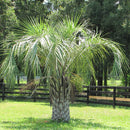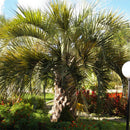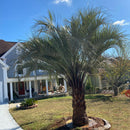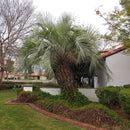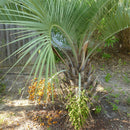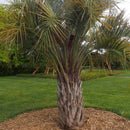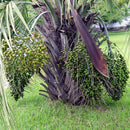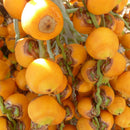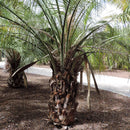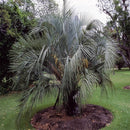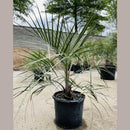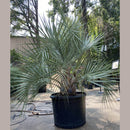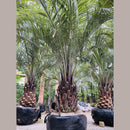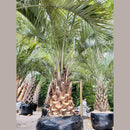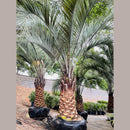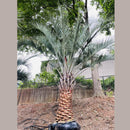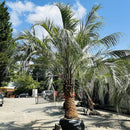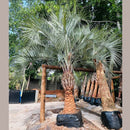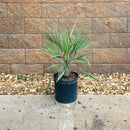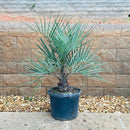| Grows Well In Zones: | 8-11 Outdoors |
| Mature Height: | 12-15 ft |
| Mature Width: | 12-15 ft |
| Sunlight: | Full Sun to Partial Shade |
| Growth Rate: | Slow |
| Shape: | Tree |
| Placement: | Outdoors |
Stunning Show-Stopper
The Pindo Palm is a medium sized feathery frond palm that adds undeniable charm to any space. It has wide and elegantly arching fronds that are a gray-green color and a short and stocky trunk that can be styled natural or diamond cut.
This attractive palm slowly grows to a mature height of up to 16 ft making it a suitable tree for planting under power lines, or as a standalone specimen in front of the house or by the pool. Adding to the palm’s undeniable beauty, the dense canopy fills with evergreen, bluish-green to grayish-green, feathery fronds that arch downward in an elegant curve, almost reaching the ground.
Whereas many feathery frond palm varieties thrive only in subtropical climates, Pindo Palms are the exception as they continue to thrive when weather gets chilly, earning the recognition for being the most cold-hardy feathery frond palm tree withstanding temperatures down to 20° F and brief periods down to 10° F.
This slow growing tropical palm offers year-round tropical greenery and produces edible fruits good for making jellies or wines, which is where they earn their common name- Jelly Palm. The fruits taste like a cross between a pineapple, banana and apricot.
Slow growing, drought tolerant and pest and disease resistant, the Pindo Palm is a fantastic option for most locations, given there is enough space for its fronds to extend to almost 14 feet wide. It is also a great candidate for containers, because of its slow growth, ease of care and superficial roots.
The thick trunk and cascading fronds on the Pindo Palm are sure to make for a stunning statement palm.
Q: Is Pindo Palm fruit edible?
A: Yes! The fruits are said to taste like a cross between a pineapple, banana and apricot. Pindo Palms also earn their common name, Jelly Palm, as the fruit can be used to make jellies or wine.
Q: How cold-hardy are Pindo Palms?
A: For a feathery frond palm, Pindo Palms are quite cold-hardy, tolerating temperatures down to 10°F, if short in duration.
Q: Can I plant a Pindo Palm in a container?
A: Yes, Pindo Palms are drought tolerant, slow growers and have superficial root systems, all of which make them ideal for containers.
Q: How fast does a Pindo Palm grow?
A: Pindo Palms grow at a slow rate of 2-4 inches per year.
Q: How tall and wide does a Pindo Palm get?
A: Pindo Palms will eventually reach a mature height of 14-16 ft, even larger in year-round warm locations. They grow almost as wide as they do tall, make sure you pick a planting spot that gives it plenty of room to grow.
1. Sunlight
Pindo Palms prefer full sun, but they can tolerate locations with partial sunlight as well.
2. Water
- For the first month, water twice a week. After it is established, water once a week unless it rains.
- Watering needs to be thorough to make sure the bottom roots receive water at every watering.
- Space out watering sessions so the roots are able to dry.
- The amount of water needed per palm per watering session is equivalent to the volume of the planting hole that was dug for each palm. This amount may range from 2 gallons for small containerized material to 15 gallons for larger palms.
- Plants in a container need more constant watering than those planted on the ground.
- Overwatering or bad drainage can cause permanent damage to the roots over time.
- Placing mulch over the roots can help with water retention. Use caution not to allow the mulch to touch the base of the palm, otherwise it can cause rot.
Seasonal watering changes
Depending on your geographic location and the intensity of the season, you may need to adjust watering accordingly:
Winter: (60 degrees or less) no need to water, except for the first 30 days after installation.
Spring: (75 degrees or less) Once a week.
Beginning of Summer: (90 degrees or less) Twice a week.
Heat of Summer: (90 degrees and above) Three times a week.
3. Fertilization
Pindo Palm Trees should be fertilized three times a year in the Spring, Summer and end of Summer. Use a general purpose blend specific to palms, and be sure to follow the instructions on the label.
4. Soil
Pindo Palms tolerate most soils, as long as they drain well.To improve drainage combine 70% soil with 30% coarse sand.
5. Pruning
Pindo Palms are not self-cleaning, so yo you’ll have to prune off any fronds when they turn brown and are completely dead. Since the tree is still gaining nutrients from fronds that contain even the slightest green, wait until the frond is completely dead before removing it.
6. Winter Care
If temperatures drop below 20° F, wrap trunk with thick blanket and if possible, wrap incandescent lights around the blanket for added heat.
Customer Reviews
Payment & Security
Your payment information is processed securely. We do not store credit card details nor have access to your credit card information.






















